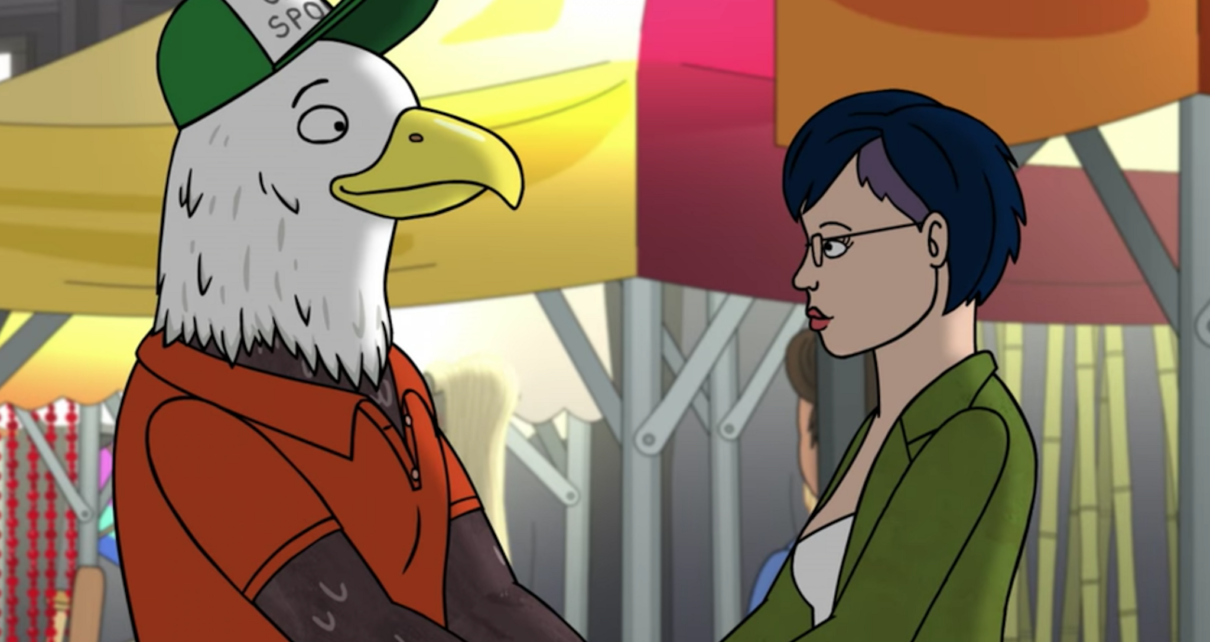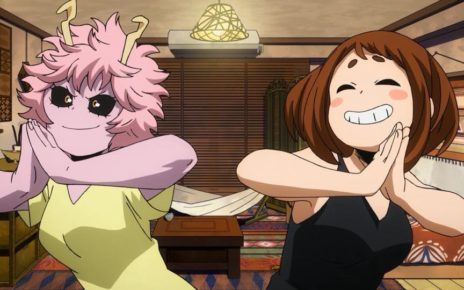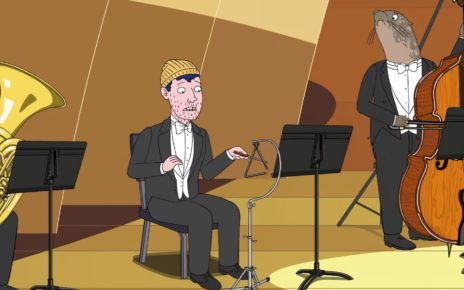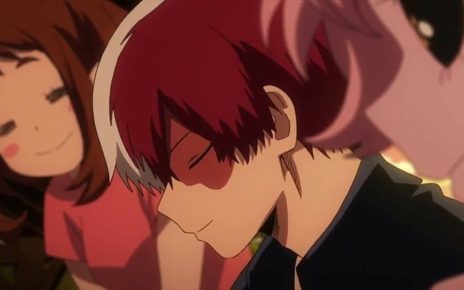
Welcome to What Horse Is He Right Now Dot Com, a collection of stories by The Dot and Line about BoJack Horseman Season 5. Spoilers for Season 5 follow.
Diane kicks off her own BoJack Horseman episode (“The Dog Days Are Over”) by sobbing her eyes out, mascara streaming down her face. She’s got a new hairdo and has swapped her usual jeans and jacket for a bright green romper and bold red heels, but clearly this change in aesthetic isn’t enough to give her a fresh start. Distressed from her recent divorce from Mr. Peanutbutter, she runs to the airport and hops on a plane—except her destination isn’t just some random place on a map for her. She goes to Hanoi, Vietnam, in what is ostensibly an attempt to explore her heritage as a Vietnamese American.
However, the lesson she ends up learning has nothing to do with her heritage.
Instead, Diane comes to the bittersweet conclusion that she can survive all the heartbreak at home from which she tries to escape, admitting that the trip has nothing to do with cultural exploration. The episode challenges the Western-centric trope of traveling to Asia to “find oneself,” pointing out how Asian Americans are also in danger of conjuring unrealistic fantasies about their sourcelands through their Americanized lens.
Diaspora is a tricky topic, fraught with complications of identity and power dynamics. Faced with the dilemma of being perceived as perpetual foreigners, Asian Americans are pressured to abandon their ancestral roots in order to assimilate into (white) American society.
This forced assimilation is apparent in Diane’s aggressively Bostonian family. One of her brothers laments in season one that Americans are losing their jobs to immigrants, and insists that the Nguyens are “as American as pho,” highlighting how disconnected the Nguyens are from their Vietnameseness. As revealed in a flashback, her father was a tenured professor of Vietnamese history at Tufts before his death but would dismiss Diane’s curiosity about her heritage. These incidents are unfortunate manifestations of assimilation, but for the Nguyens, it goes beyond external pressures to Americanize.
While much of the talk about dysfunctional families centers on BoJack’s toxic parents, Diane hasn’t grown up under the most nurturing roof, either. She’s repeatedly belittled and gaslighted by her family. A cursory glance at Asian-American literature shows how pivotal parents can be in the process of connecting with one’s ethnic identity. However, Diane’s childhood and adolescence do not fit with this prominent theme in Asian-American literature, an experience that is sure to cause much dissonance.
In spite of her unhealthy family life, Diane becomes an upstanding adult who is vocal about social justice. She’s clearly driven to educate herself about Asian America and make up for the lack of information from her parents. However, she’s not impervious to the Americentric lens she’s internalized from a lifetime in the United States, especially when she’s been actively denied access to her Vietnameseness during her formative years.
Things come to a head in Hanoi when Diane meets an American man, aptly portrayed by an eagle. Despite being conscious of the exotification of Vietnamese women, she chooses to capitalize on this exotification anyway, pretending not to speak English. As she phrases it, the facade is part of an attempt to discover a new self. When her cover is blown, she points out how the eagle got to play out his fetishistic Miss Saigon fantasy with a silent and mysterious Vietnamese manic pixie dream girl. However, just moments before, she describes how liberating it is to allow this stranger to project his assumptions on her.
Diane has no qualms about being objectified throughout her tryst with the eagle until her Americanness is revealed and she can no longer benefit from her perceived otherness. While she experience may have felt freeing, Diane has unwittingly enforced a trope that damages and otherizes Asian women in the sourceland. Yes, Asian American women are also subject to a similar type of fetishization, but Diane is able to extract herself from this particular situation, shielded by the privilege her American citizenship affords her.
On the plane back to L.A., Diane sits next to Laura Linney, who’s been shooting a movie about a woman who goes to Vietnam to find herself. In a last-ditch effort to find inspiration on her trip, Diane asks Linney about the ending. The absurdity of the movie’s plot line underscores the absurdity of the notion of finding oneself, jolting Diane out of her Americentric mindset. Linney’s character does find herself — or, more accurately, she finds her clone, which is thoroughly nonsensical. It’s an appropriate conclusion, though: “Finding oneself” in an “exotic” locale, whether or not it’s one’s sourceland, is absolute nonsense.
Stefani demands content from her, so Diane takes the opportunity to chronicle her trip in the form of a Girl Croosh travel guide. She condenses the experience into a listicle with 10 entries for easy consumption for her Western readership. Following the encounter with Linney, however, Diane concludes her listicle by admitting that none of the reasons she’s listed are the real motivation behind her impulsive trip—not even “to connect with your ancestral roots.” Diane faces the reality that she’d boarded the flight expecting to find some semblance of connection that she lacks in Hollywoo. Towards the end of the episode, she stands as the background cycles through the places she’s been, wearing the same forlorn expression regardless of the country she’s in.
She doesn’t find the secret to being happy just by traveling to Vietnam, because there isn’t anything mystical or exotic about the foreign land her ancestors hail from. The meaning of life isn’t hidden in the markets of Hanoi, waiting to be unearthed. She can’t uncover a shiny new self simply by walking among a sea of faces that look like hers.
Diane unwittingly falls into the trap of Western-centric consumption of Asia by trying to convince herself the trip is an attempt to explore her Vietnameseness, when in reality, she’s there to escape from her problems. She doesn’t really reconnect with her ancestral roots because she’s in Vietnam in search of distraction, rather than in a genuine attempt to learn about her sourceland. Therein lies the fine line between searching for the cultural origins denied to her versus consuming her sourceland.
But now that Diane has realized that she tried to use Vietnam as an escape, perhaps the show will have her return and learn to view Vietnam more as an active source of pride, rather than a passive way to flee from her troubles in Hollywoo.
She might not find herself there, per se, but she might find a piece of what makes her Diane Nguyen, a proud Vietnamese-American feminist.

Thanks for reading The Dot and Line, where we talk about animation of all kinds. Don’t forget to for this article and follow us on Twitter and Facebook.





